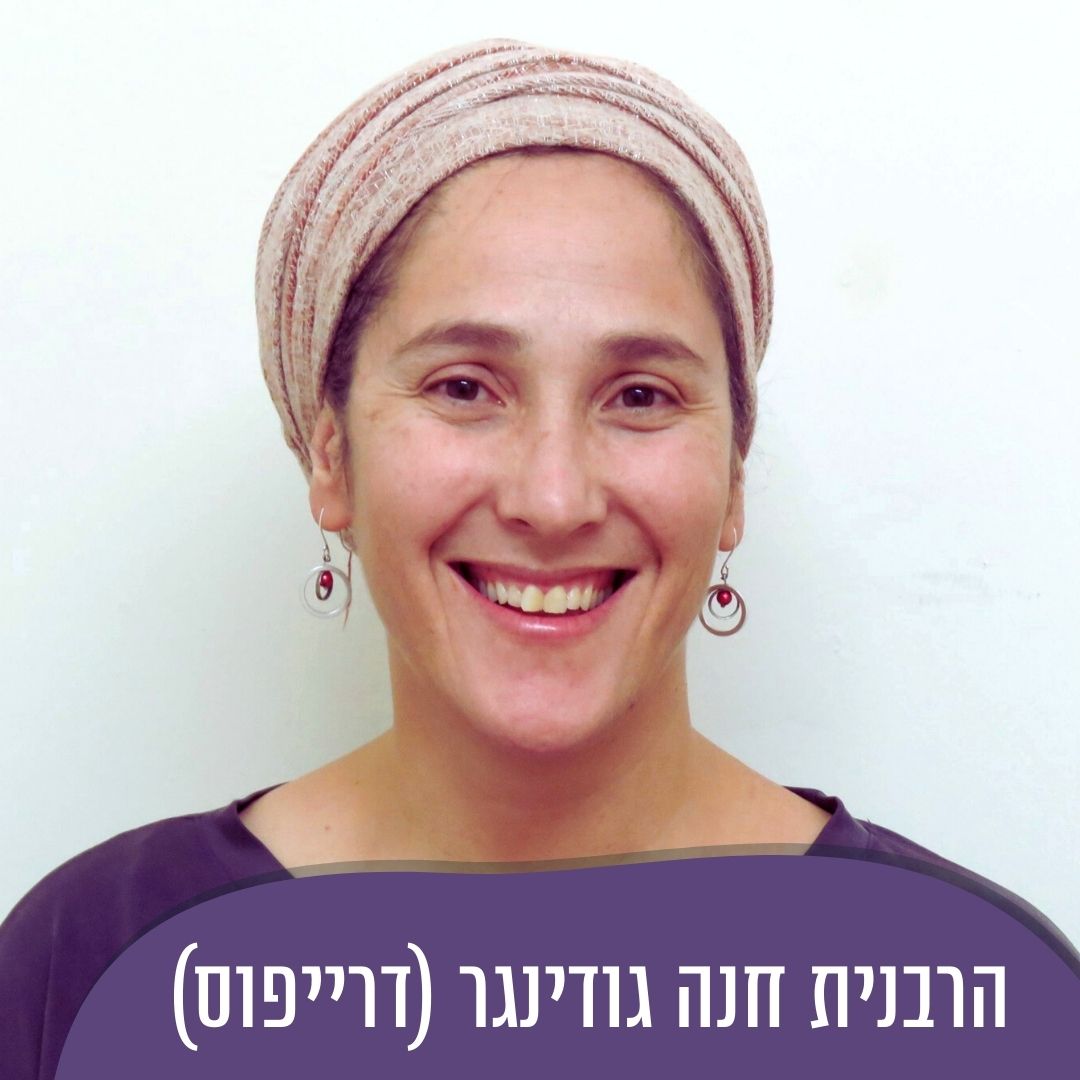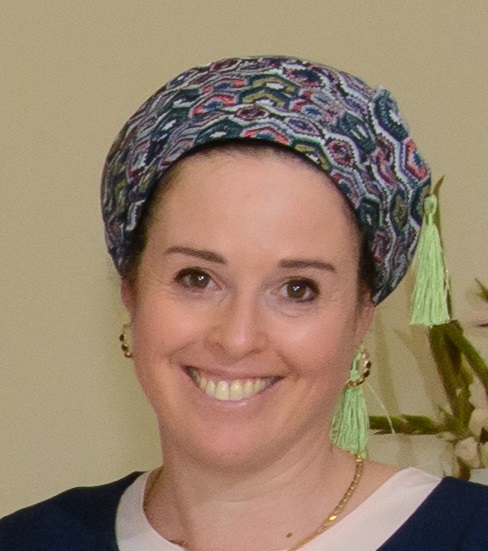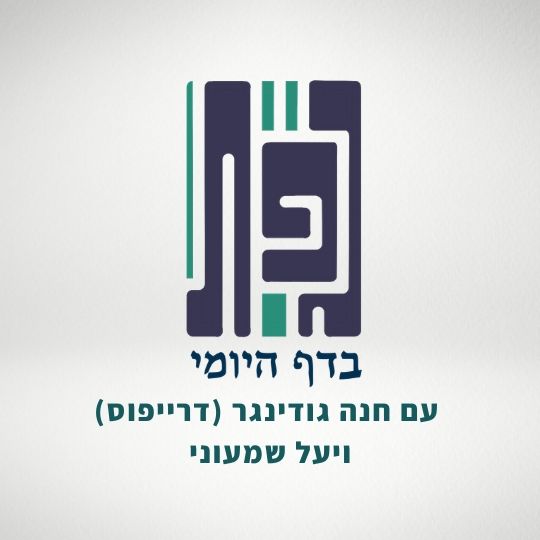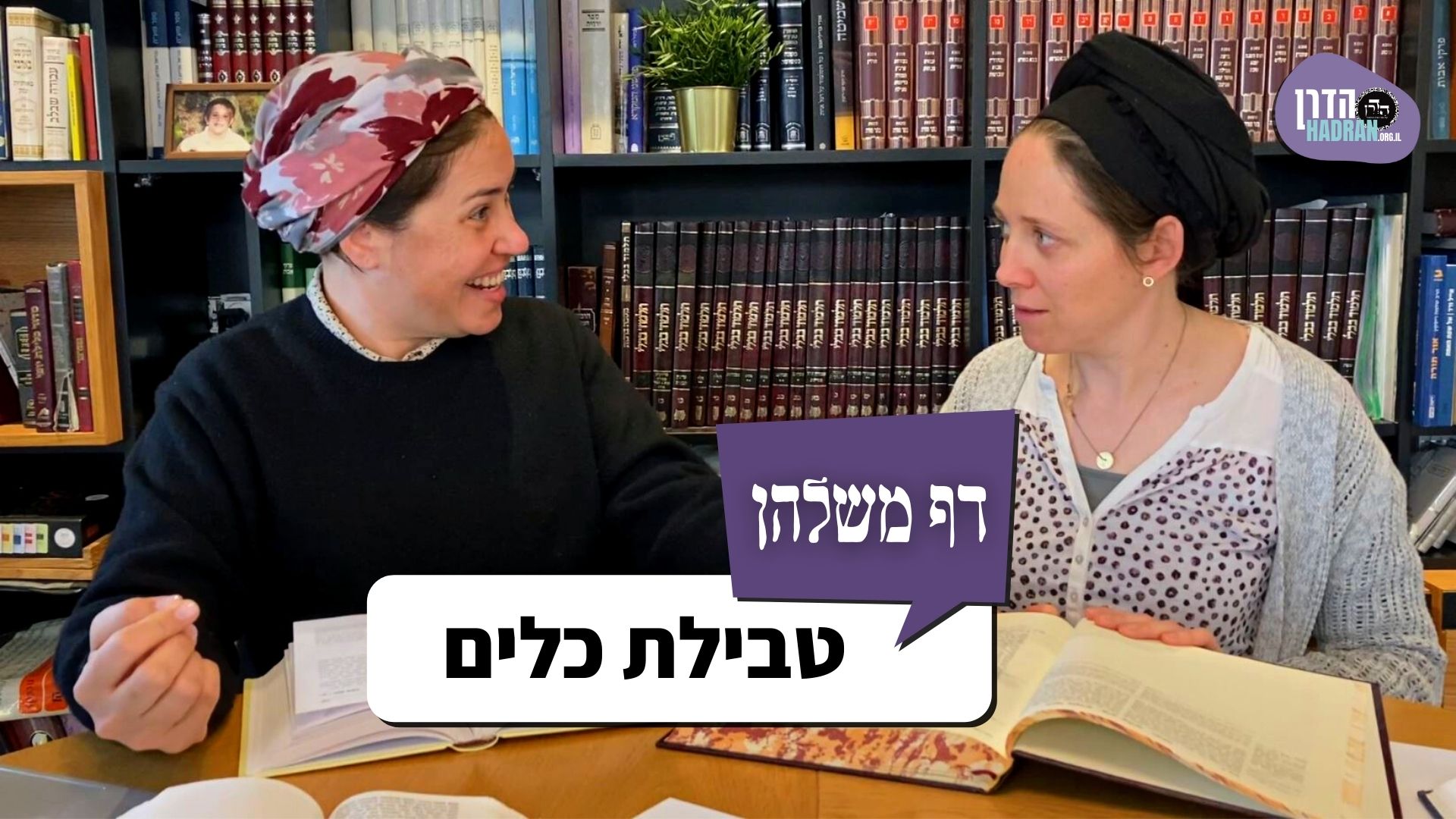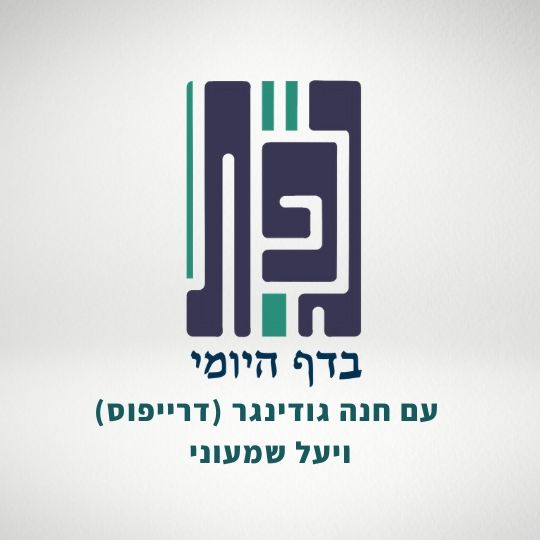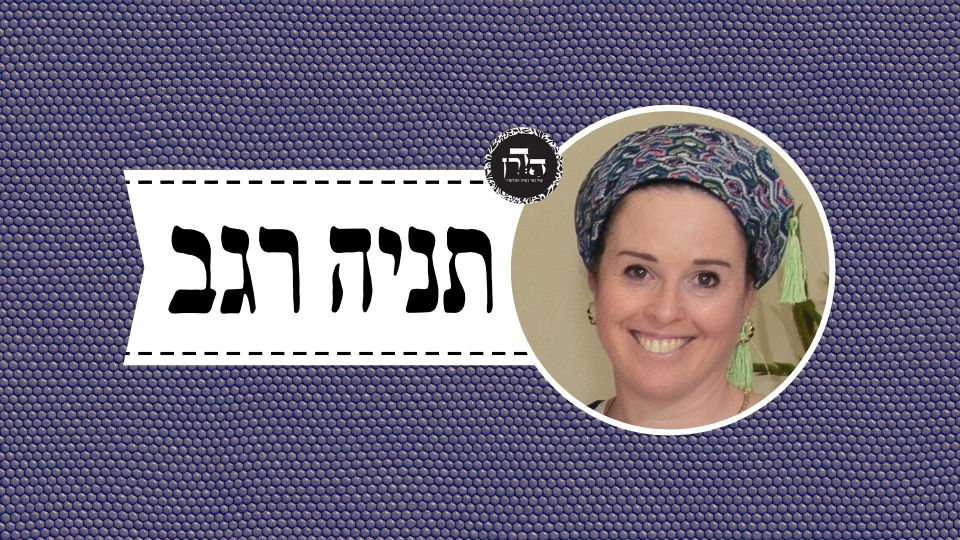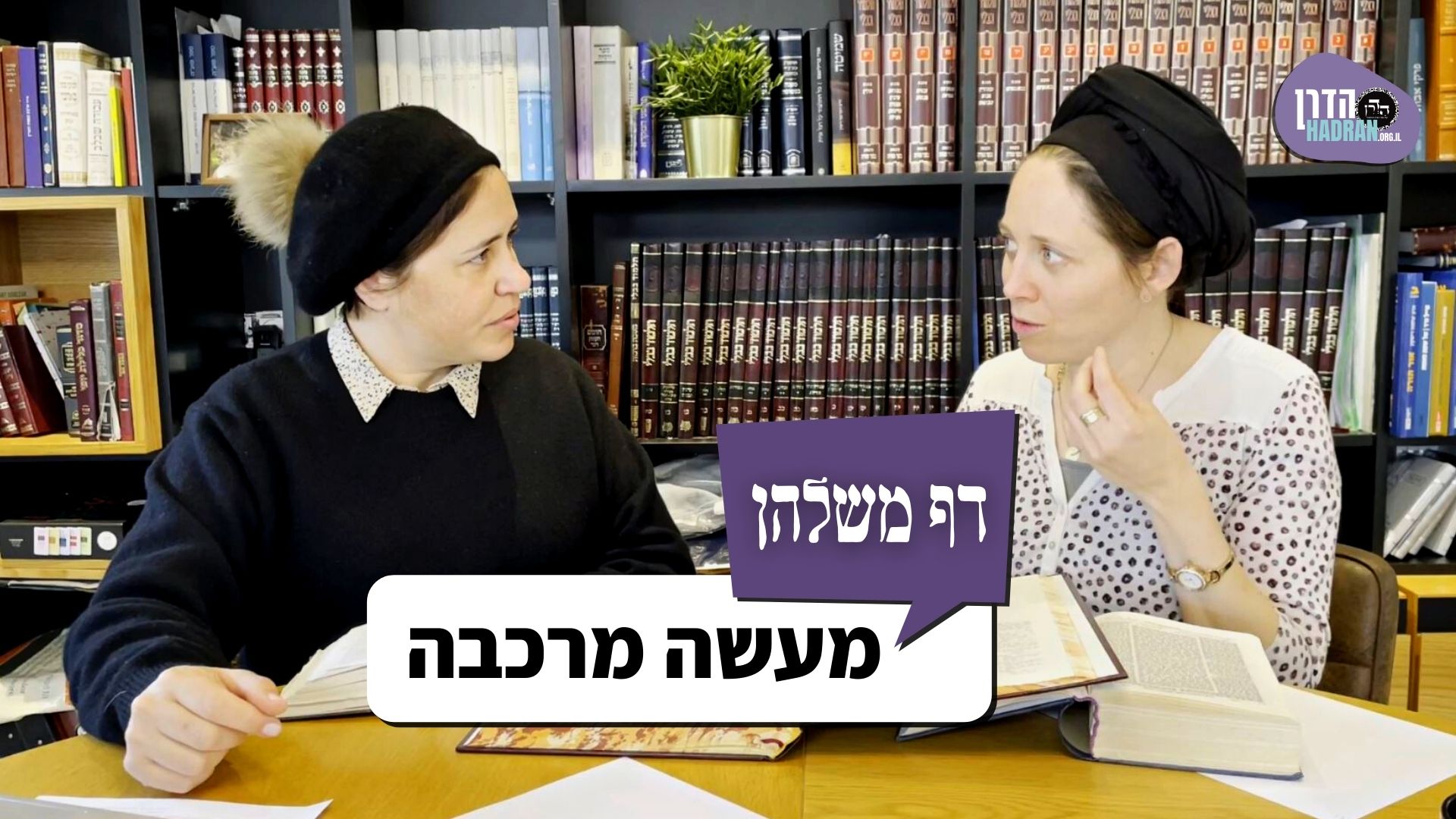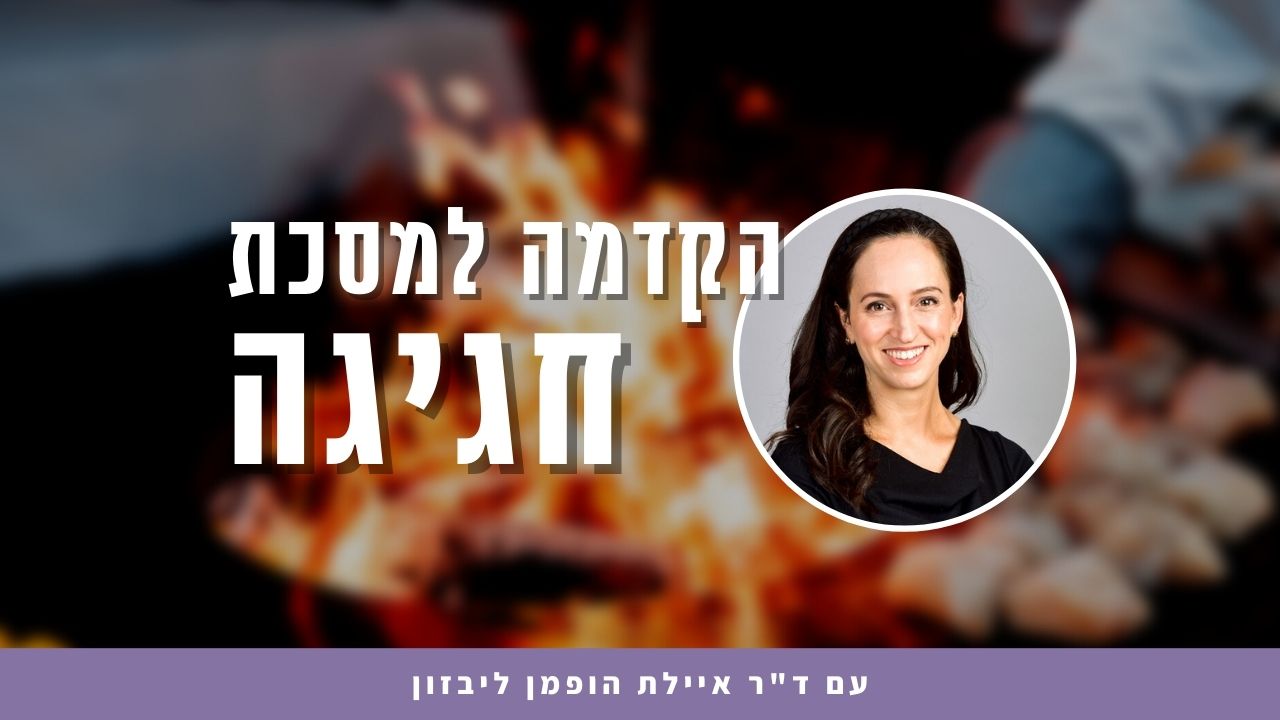חגיגה טז
מַאי דְּרַשׁ? אָמַר רַבָּה בַּר בַּר חָנָה אָמַר רַבִּי יוֹחָנָן: ״וְאָתָא מֵרִבְבוֹת קֹדֶשׁ״ — אוֹת הוּא בָּרְבָבָה שֶׁלּוֹ.
The Gemara asks: What verse did Rabbi Akiva expound that prevented him from making the same mistake as Aḥer? Rabba bar bar Ḥana said that Rabbi Yoḥanan said: It was the following: “And He came [ve’ata] from the holy myriads” (Deuteronomy 33:2), which he explained in this manner: He, God, is unique [ot] among His myriads of angels. Therefore, he knew that he had merely seen an angel.
וְרַבִּי אֲבָהוּ אָמַר: ״דָּגוּל מֵרְבָבָה״ — דּוּגְמָא הוּא בָּרְבָבָה שֶׁלּוֹ.
And Rabbi Abbahu said: Rabbi Akiva expounded the verse: “Preeminent above a myriad” (Song of Songs 5:10) to indicate that He is exemplary among His myriad.
וְרֵישׁ לָקִישׁ אָמַר: ״ה׳ צְבָאוֹת שְׁמוֹ״ — אָדוֹן הוּא בַּצָּבָא שֶׁלּוֹ.
And Reish Lakish said: He expounded the verse: “The Lord of hosts is His name” (Isaiah 48:2); He is the Master in His host.
וְרַבִּי חִיָּיא בַּר אַבָּא אָמַר רַבִּי יוֹחָנָן: ״לֹא בָרוּחַ ה׳ וְאַחַר הָרוּחַ רַעַשׁ לֹא בָרַעַשׁ ה׳. וְאַחַר הָרַעַשׁ אֵשׁ לֹא בָאֵשׁ ה׳ וְאַחַר הָאֵשׁ קוֹל דְּמָמָה דַקָּה״, ״וְהִנֵּה ה׳ עוֹבֵר״.
And Rav Ḥiyya bar Abba said that Rabbi Yoḥanan said: He expounded the verses: “But the Lord was not in the wind. And after the wind, an earthquake; the Lord was not in the earthquake. And after the earthquake, fire; but the Lord was not in the fire. And after the fire, a still, small voice,” and it states in that verse: “And behold, the Lord passed by” (I Kings 19:11–12). Rabbi Akiva used this verse in order to recognize the place of His presence and refrain from trespassing there.
תָּנוּ רַבָּנַן, שִׁשָּׁה דְּבָרִים נֶאֶמְרוּ בַּשֵּׁדִים: שְׁלֹשָׁה כְּמַלְאֲכֵי הַשָּׁרֵת, וּשְׁלֹשָׁה כִּבְנֵי אָדָם. שְׁלֹשָׁה כְּמַלְאֲכֵי הַשָּׁרֵת — יֵשׁ לָהֶם כְּנָפַיִם כְּמַלְאֲכֵי הַשָּׁרֵת, וְטָסִין מִסּוֹף הָעוֹלָם וְעַד סוֹפוֹ כְּמַלְאֲכֵי הַשָּׁרֵת, וְיוֹדְעִין מַה שֶּׁעָתִיד לִהְיוֹת כְּמַלְאֲכֵי הַשָּׁרֵת.
§ The Gemara returns to discussing the heavenly beings. The Sages taught: Six statements were said with regard to demons: In three ways they are like ministering angels, and in three ways they are like humans. The baraita specifies: In three ways they are like ministering angels: They have wings like ministering angels; and they fly from one end of the world to the other like ministering angels; and they know what will be in the future like ministering angels.
יוֹדְעִין סָלְקָא דַּעְתָּךְ?! אֶלָּא, שׁוֹמְעִין מֵאֲחוֹרֵי הַפַּרְגּוֹד, כְּמַלְאֲכֵי הַשָּׁרֵת.
The Gemara is puzzled by this last statement: Should it enter your mind that they know this? Not even the angels are privy to the future. Rather, they hear from behind the curtain when God reveals something of the future, like ministering angels.
וּשְׁלֹשָׁה כִּבְנֵי אָדָם — אוֹכְלִין וְשׁוֹתִין כִּבְנֵי אָדָם, פָּרִין וְרָבִין כִּבְנֵי אָדָם, וּמֵתִים כִּבְנֵי אָדָם.
And in three ways they are similar to humans: They eat and drink like humans; they multiply like humans; and they die like humans.
שִׁשָּׁה דְּבָרִים נֶאֶמְרוּ בִּבְנֵי אָדָם: שְׁלֹשָׁה כְּמַלְאֲכֵי הַשָּׁרֵת, שְׁלֹשָׁה כִּבְהֵמָה. שְׁלֹשָׁה כְּמַלְאֲכֵי הַשָּׁרֵת — יֵשׁ לָהֶם דַּעַת כְּמַלְאֲכֵי הַשָּׁרֵת, וּמְהַלְּכִין בְּקוֹמָה זְקוּפָה כְּמַלְאֲכֵי הַשָּׁרֵת, וּמְסַפְּרִים בִּלְשׁוֹן הַקֹּדֶשׁ כְּמַלְאֲכֵי הַשָּׁרֵת. שְׁלֹשָׁה כִּבְהֵמָה — אוֹכְלִין וְשׁוֹתִין כִּבְהֵמָה, וּפָרִין וְרָבִין כִּבְהֵמָה, וּמוֹצִיאִין רְעִי כִּבְהֵמָה.
Six statements were said with regard to humans: In three ways, they are like ministering angels, and in three ways they are like animals. The baraita explains: In three ways they are like ministering angels: They have intelligence like ministering angels; and they walk upright like ministering angels; and they speak in the holy tongue like ministering angels. In three ways humans are like animals: They eat and drink like animals; and they multiply like animals; and they emit excrement like animals.
כׇּל הַמִּסְתַּכֵּל בְּאַרְבָּעָה דְּבָרִים רָתוּי לוֹ שֶׁלֹּא בָּא לָעוֹלָם כּוּ׳. בִּשְׁלָמָא מָה לְמַעְלָה מָה לְמַטָּה מָה לְאָחוֹר — לְחַיֵּי. אֶלָּא לְפָנִים — מָה דַּהֲוָה הֲוָה?
§ The mishna taught: Whoever looks at four things, it would have been better for him had he never entered the world: Anyone who reflects upon that which is above the firmament; that which is below the earth; what was before the creation of the world; and what will be after the end of the world. The Gemara asks: Granted, it is prohibited to reflect on what is above, what is below, and what is after. This is fine, since one is examining things that are not part of the world but lie beyond it. But before the creation of the world, what has happened has happened. Why is it prohibited to reflect upon this?
רַבִּי יוֹחָנָן וְרַבִּי אֶלְעָזָר דְאָמְרִי תַּרְוַיְיהוּ: מָשָׁל לְמֶלֶךְ בָּשָׂר וָדָם שֶׁאָמַר לַעֲבָדָיו: בְּנוּ לִי פַּלְטֵירִין גְּדוֹלִין עַל הָאַשְׁפָּה. הָלְכוּ וּבָנוּ לוֹ, אֵין רְצוֹנוֹ שֶׁל מֶלֶךְ לְהַזְכִּיר שֵׁם אַשְׁפָּה.
The Gemara explains: Rabbi Yoḥanan and Rabbi Elazar both say: This can be demonstrated through a parable with regard to a flesh-and-blood king who said to his servants: Build for me large palaces on a garbage dump. They went and built them for him. Clearly, in that case, the king does not desire that they mention the garbage dump. Here too, God does not want people to concern themselves with the chaos that preceded the world.
כׇּל שֶׁלֹּא חָס עַל כְּבוֹד קוֹנוֹ, רָתוּי לוֹ שֶׁלֹּא בָּא לְעוֹלָם. מַאי הִיא? רַבִּי אַבָּא אָמַר: זֶה הַמִּסְתַּכֵּל בַּקֶּשֶׁת. רַב יוֹסֵף אָמַר: זֶה הָעוֹבֵר עֲבֵירָה בַּסֵּתֶר. מִסְתַּכֵּל בַּקֶּשֶׁת, דִּכְתִיב: ״כְּמַרְאֵה הַקֶּשֶׁת אֲשֶׁר יִהְיֶה בֶעָנָן בְּיוֹם הַגֶּשֶׁם כֵּן מַרְאֵה הַנֹּגַהּ סָבִיב הוּא מַרְאֵה דְּמוּת כְּבוֹד ה׳״.
It is taught in the mishna: Whoever has no concern for the honor of his Maker deserves to have never come to the world. The Gemara asks: What is lack of concern for the honor of one’s Maker? Rabbi Abba said: This is one who looks at a rainbow. Rav Yosef said: This is one who commits a transgression in private. They proceed to clarify their opinions: Looking at a rainbow constitutes an act of disrespect toward the Divine Presence, as it is written: “As the appearance of the bow that is in the cloud in the day of rain so was the appearance of the brightness round about. This was the appearance of the likeness of the glory of the Lord” (Ezekiel 1:28), and it is a dishonor to God to stare at His likeness.
רַב יוֹסֵף אָמַר: זֶה הָעוֹבֵר עֲבֵירָה בַּסֵּתֶר, כִּדְרַבִּי יִצְחָק. דְּאָמַר רַבִּי יִצְחָק: כׇּל הָעוֹבֵר עֲבֵירָה בַּסֵּתֶר, כְּאִילּוּ דּוֹחֵק רַגְלֵי שְׁכִינָה, שֶׁנֶּאֱמַר: ״כֹּה אָמַר ה׳ הַשָּׁמַיִם כִּסְאִי וְהָאָרֶץ הֲדוֹם רַגְלָי״.
Rav Yosef said: This is one who commits a transgression in private, in accordance with Rabbi Yitzḥak, as Rabbi Yitzḥak said: Whoever commits a transgression in private, it is as though he pushed away the feet of the Divine Presence, as it is stated: “Thus said the Lord: The heavens are My seat, and the earth My footstool” (Isaiah 66:1). If one believes that no one can see what he is doing in private, it is as though he said that God is absent from that place. He is therefore compared to one who attempts to remove God from His footstool.
אִינִי?! וְהָאָמַר רַבִּי אִלְעָא הַזָּקֵן: אִם רוֹאֶה אָדָם שֶׁיִּצְרוֹ מִתְגַּבֵּר עָלָיו — יֵלֵךְ לְמָקוֹם שֶׁאֵין מַכִּירִין אוֹתוֹ, וְיִלְבַּשׁ שְׁחוֹרִין וְיִתְעַטֵּף שְׁחוֹרִין, וְיַעֲשֶׂה מַה שֶּׁלִּבּוֹ חָפֵץ, וְאַל יְחַלֵּל שֵׁם שָׁמַיִם בְּפַרְהֶסְיָא! לָא קַשְׁיָא: הָא — דְּמָצֵי כָּיֵיף לֵיהּ לְיִצְרֵיהּ, הָא — דְּלָא מָצֵי כָּיֵיף לְיִצְרֵיהּ.
The Gemara raises a difficulty: And is that so? But didn’t Rabbi Ela the Elder say: If a person sees that his inclination is overcoming him, he should go to a place where he is unknown, and wear black, and wrap himself in black, in the manner of mourners, because he should be ashamed of his weakness, and do there what his heart desires, but let him not desecrate the Name of Heaven in public. This shows that sinning in private is sometimes preferable to the public performance of a transgression. The Gemara answers: This is not difficult. This case, where one who commits a transgression in public has no concern for the honor of his Maker, occurs when one is capable of overcoming his inclination and fails to do so. That case, where it is preferable to sin in private, occurs when one is incapable of overcoming his inclination. He is therefore advised to, at the very least, refrain from desecrating God’s name in public.
דָּרֵשׁ רַבִּי יְהוּדָה בְּרַבִּי נַחְמָנִי מְתוּרְגְּמָנֵיהּ דְּרֵישׁ לָקִישׁ: כׇּל הַמִּסְתַּכֵּל בִּשְׁלֹשָׁה דְּבָרִים עֵינָיו כֵּהוֹת: בַּקֶּשֶׁת, וּבַנָּשִׂיא, וּבַכֹּהֲנִים. בַּקֶּשֶׁת — דִּכְתִיב: ״כְּמַרְאֵה הַקֶּשֶׁת אֲשֶׁר יִהְיֶה בֶעָנָן בְּיוֹם הַגֶּשֶׁם הוּא מַרְאֵה דְּמוּת כְּבוֹד ה׳״. בַּנָּשִׂיא — דִּכְתִיב: ״וְנָתַתָּ מֵהוֹדְךָ עָלָיו״. הַמִּסְתַּכֵּל בַּכֹּהֲנִים בִּזְמַן שֶׁבֵּית הַמִּקְדָּשׁ קַיָּים, שֶׁהָיוּ עוֹמְדִין עַל דּוּכָנָן וּמְבָרְכִין אֶת יִשְׂרָאֵל בַּשֵּׁם הַמְפוֹרָשׁ.
Rabbi Yehuda, son of Rabbi Naḥmani, the disseminator of Reish Lakish, interpreted a verse homiletically: Whoever looks at the following three things, his eyes will grow dim: One who looks at a rainbow, at a Nasi, and at the priests. He explains: At a rainbow, as it is written: “As the appearance of the bow that is in the cloud on the day of rain, so was the appearance of the brightness round about, this was the appearance of the likeness of the glory of the Lord” (Ezekiel 1:28). At a Nasi, as it is written: “And you shall put of your splendor upon him” (Numbers 27:20), which indicates that the splendor of the Divine Presence rested upon Moses, who was the Nasi of Israel. The third item, looking at priests, is referring to one who looks at the priests when the Temple is standing, as they would stand on their platform and bless Israel with the ineffable name, at which point the Divine Presence would rest above the joints of their fingers.
דָּרֵשׁ רַבִּי יְהוּדָה בְּרַבִּי נַחְמָנִי מְתוּרְגְּמָנֵיהּ דְּרֵישׁ לָקִישׁ, מַאי דִּכְתִיב: ״אַל תַּאֲמִינוּ בְרֵעַ אַל תִּבְטְחוּ בְּאַלּוּף״ — אִם יֹאמַר לְךָ יֵצֶר הָרָע, חֲטוֹא וְהַקָּדוֹשׁ בָּרוּךְ הוּא מוֹחֵל אַל תַּאֲמֵן, שֶׁנֶּאֱמַר: ״אַל תַּאֲמִינוּ בְרֵעַ״, וְאֵין ״רַע״ אֶלָּא יֵצֶר הָרַע שֶׁנֶּאֱמַר ״כִּי יֵצֶר לֵב הָאָדָם רַע״,
Apropos this Sage, the Gemara cites another statement of his: Rabbi Yehuda, son of Rabbi Naḥmani, the disseminator of Reish Lakish, interpreted a verse homiletically: What is the meaning of that which is written: “Trust not in a companion, do not put your confidence in an intimate friend” (Micah 7:5)? If the evil inclination says to you: Sin, and the Holy One, Blessed be He, will forgive, do not trust it, since it is stated: “Trust not in a companion [rei’a].” And rei’a is referring to none other than the evil [ra] inclination, as it is stated: “For the inclination of the heart of man is evil [ra]” (Genesis 8:21).
וְאֵין ״אַלּוּף״ אֶלָּא הַקָּדוֹשׁ בָּרוּךְ הוּא, שֶׁנֶּאֱמַר: ״אַלּוּף נְעוּרַי אָתָּה״. שֶׁמָּא תֹּאמַר מִי מֵעִיד בִּי? אַבְנֵי בֵיתוֹ וְקוֹרוֹת בֵּיתוֹ שֶׁל אָדָם הֵם מְעִידִין בּוֹ, שֶׁנֶּאֱמַר: ״כִּי אֶבֶן מִקִּיר תִּזְעָק וְכָפִיס מֵעֵץ יַעֲנֶנָּה״,
And “intimate friend” is referring to none other than the Holy One, Blessed be He, as it is stated: “You are the intimate friend of my youth” (Jeremiah 3:4). Lest you say: Since I am acting in private, who will testify against me? The stones of the house and the beams of the house of each person testify against him, as it is stated: “For the stone shall cry out of the wall, and the beam out of the timber shall answer it” (Habakkuk 2:11).
וַחֲכָמִים אוֹמְרִים: נִשְׁמָתוֹ שֶׁל אָדָם מְעִידָה בּוֹ שֶׁנֶּאֱמַר ״מִשֹּׁכֶבֶת חֵיקֶךָ שְׁמוֹר פִּתְחֵי פִיךָ״, (אִי זוֹ הִיא דָּבָר שֶׁשּׁוֹכֶבֶת) [אֵי זֶה הוּא דָּבָר שֶׁשָּׁרוּי] בְּחֵיקוֹ שֶׁל אָדָם — הֱוֵי אוֹמֵר: זוֹ נְשָׁמָה. רַבִּי זְרִיקָא אֹמֵר: שְׁנֵי מַלְאֲכֵי הַשָּׁרֵת הַמְלַוִּין אוֹתוֹ, הֵן מְעִידִין בּוֹ, שֶׁנֶּאֱמַר: ״כִּי מַלְאָכָיו יְצַוֶּה לָּךְ לִשְׁמָרְךָ בְּכׇל דְּרָכֶיךָ״. וַחֲכָמִים אוֹמְרִים: אֵבָרָיו שֶׁל אָדָם מְעִידִין בּוֹ, שֶׁנֶּאֱמַר: ״וְאַתֶּם עֵדַי נְאֻם ה’ וַאֲנִי אֵל״.
And the Sages say: A person’s soul shall itself testify against him, as it is stated: “Guard the doors of your mouth from she who lies in your bosom” (Micah 7:5). What thing lies in a person’s bosom? You must say it is his soul. Rabbi Zerika said: The two ministering angels who accompany him, i.e., each individual, they testify against him, as it is stated: “For He will command His angels over you, to guard you in all your ways” (Psalms 91:11). And the Sages say: A person’s limbs testify against him, as it is stated: “Therefore you are My witnesses, says the Lord, and I am God” (Isaiah 43:12), which indicates that each individual becomes his own witness and testifies against himself on the Day of Judgment.
מַתְנִי׳ יוֹסֵי בֶּן יוֹעֶזֶר אוֹמֵר שֶׁלֹּא לִסְמוֹךְ, יוֹסֵף בֶּן יוֹחָנָן אוֹמֵר לִסְמוֹךְ. יְהוֹשֻׁעַ בֶּן פְּרַחְיָה אוֹמֵר שֶׁלֹּא לִסְמוֹךְ, נִיתַּאי הַאַרְבֵּלִי אוֹמֵר לִסְמוֹךְ. יְהוּדָה בֶּן טָבַאי אוֹמֵר שֶׁלֹּא לִסְמוֹךְ, שִׁמְעוֹן בֶּן שָׁטַח אוֹמֵר לִסְמוֹךְ. שְׁמַעְיָה אוֹמֵר לִסְמוֹךְ, אַבְטַלְיוֹן אוֹמֵר שֶׁלֹּא לִסְמוֹךְ. הִלֵּל וּמְנַחֵם לֹא נֶחְלְקוּ. יָצָא מְנַחֵם, נִכְנַס שַׁמַּאי. שַׁמַּאי אוֹמֵר שֶׁלֹּא לִסְמוֹךְ, הִלֵּל אוֹמֵר לִסְמוֹךְ.
MISHNA: Yosei ben Yo’ezer says not to place one’s hands on offerings before slaughtering them on a Festival because this is considered performing labor with an animal on a Festival. His colleague, Yosef ben Yoḥanan, says to place them; Yehoshua ben Peraḥya says not to place them; Nitai HaArbeli says to place them; Yehuda ben Tabbai says not to place them; Shimon ben Shataḥ says to place them; Shemaya says to place them; Avtalyon says not to place them. Hillel and Menaḥem did not disagree with regard to this issue. Menaḥem departed from his post, and Shammai entered in his stead. Shammai says not to place them; Hillel says to place them.
הָרִאשׁוֹנִים הָיוּ נְשִׂיאִים, וּשְׁנִיִּים לָהֶם אֲבוֹת בֵּית דִּין.
The first members of each pair served as Nasi, and their counterparts served as deputy Nasi.
גְּמָ׳ תָּנוּ רַבָּנַן: שְׁלֹשָׁה מִזּוּגוֹת הָרִאשׁוֹנִים שֶׁאָמְרוּ שֶׁלֹּא לִסְמוֹךְ, וּשְׁנַיִם מִזּוּגוֹת הָאַחֲרוֹנִים שֶׁאָמְרוּ לִסְמוֹךְ — (הָרִאשׁוֹנִים) הָיוּ נְשִׂיאִים, וּשְׁנִיִּים לָהֶם אֲבוֹת בֵּית דִּין, דִּבְרֵי רַבִּי מֵאִיר. וַחֲכָמִים אוֹמְרִים: יְהוּדָה בֶּן טָבַאי — אַב בֵּית דִּין, וְשִׁמְעוֹן בֶּן שָׁטַח — נָשִׂיא.
GEMARA: The Sages taught: Three of the first pairs who say not to place hands and two of the last pairs who say to place hands served as Nasi, and their counterparts served as deputy Nasi; this is the statement of Rabbi Meir. And the Rabbis say the opposite: Yehuda ben Tabbai was deputy Nasi and Shimon ben Shataḥ was the Nasi.
מַאן תְּנָא לְהָא דְּתָנוּ רַבָּנַן: אָמַר רַבִּי יְהוּדָה בֶּן טָבַאי: אֶרְאֶה בְּנֶחָמָה אִם לֹא הָרַגְתִּי עֵד זוֹמֵם, לְהוֹצִיא מִלִּבָּן שֶׁל צַדּוּקִין. שֶׁהָיוּ אוֹמְרִים: אֵין עֵדִים זוֹמְמִין נֶהֱרָגִין עַד שֶׁיֵּהָרֵג הַנִּידּוֹן.
The Gemara asks: Who is the tanna who taught that which the Sages taught in a baraita: Rabbi Yehuda ben Tabbai said: I swear that I will not see the consolation of Israel if I did not kill a conspiring witness. This means that Rabbi Yehuda ben Tabbai sentenced a conspiring witness to death, in order to counter the views of the Sadducees, who would say: Conspiring witnesses are not executed unless the sentenced one has been executed. Their views opposed the traditional view, which maintains that conspiring witnesses are executed only if the one sentenced by their testimony has not yet been executed.
אָמַר לוֹ שִׁמְעוֹן בֶּן שָׁטַח: אֶרְאֶה בְּנֶחָמָה אִם לֹא שָׁפַכְתָּ דָּם נָקִי, שֶׁהֲרֵי אָמְרוּ חֲכָמִים: אֵין עֵדִים זוֹמְמִין נֶהֱרָגִין עַד שֶׁיִּזּוֹמּוּ שְׁנֵיהֶם, וְאֵין לוֹקִין עַד שֶׁיִּזּוֹמּוּ שְׁנֵיהֶם, וְאֵין מְשַׁלְּמִין מָמוֹן עַד שֶׁיִּזּוֹמּוּ שְׁנֵיהֶם.
Shimon ben Shataḥ said to him: I swear that I will not see the consolation of Israel if you did not shed innocent blood, as the Sages said: Conspiring witnesses are not executed unless they are both found to be conspirators; if only one is found to be a conspirator, he is not executed. And they are not flogged if they are liable to such a penalty, unless they are both found to be conspirators. And if they testified falsely that someone owed money, they do not pay money unless they are both found to be conspirators.
מִיָּד קִבֵּל עָלָיו יְהוּדָה בֶּן טָבַאי שֶׁאֵינוֹ מוֹרֶה הֲלָכָה אֶלָּא בִּפְנֵי שִׁמְעוֹן בֶּן שָׁטַח.
Hearing this, Yehuda ben Tabbai immediately accepted upon himself not to rule on any matter of law unless he was in the presence of Shimon ben Shataḥ, as he realized he could not rely on his own judgment.
כׇּל יָמָיו שֶׁל יְהוּדָה בֶּן טָבַאי הָיָה מִשְׁתַּטֵּחַ עַל קִבְרוֹ שֶׁל אוֹתוֹ הָרוּג, וְהָיָה קוֹלוֹ נִשְׁמָע. כִּסְבוּרִין הָעָם לוֹמַר שֶׁקּוֹלוֹ שֶׁל הָרוּג הוּא. אָמַר לָהֶם: קוֹלִי הוּא. תֵּדְעוּ, שֶׁלְּמָחָר הוּא מֵת, וְאֵין קוֹלוֹ נִשְׁמָע.
The baraita further relates: All of Yehuda ben Tabbai’s days, he would prostrate himself on the grave of that executed individual, to request forgiveness, and his voice was heard weeping. The people thought that it was the voice of that executed person, rising from his grave. Yehuda ben Tabbai said to them: It is my voice, and you shall know that it is so, for tomorrow, i.e., sometime in the future, he will die, and his voice will no longer be heard. Yehuda ben Tabbai was referring to himself, but he did not want to mention something negative about himself in direct terms.
אֲמַר לֵיהּ רַב אַחָא בְּרֵיהּ דְּרָבָא לְרַב אָשֵׁי: וְדִלְמָא פַּיּוֹסֵי פַּיְּיסֵיהּ, אוֹ בְּדִינָא תַּבְעֵיהּ.
Rav Aḥa, son of Rava, said to Rav Ashi: This provides no conclusive proof that the voice was not that of the executed man, as perhaps ben Tabbai appeased the executed individual in the World-to-Come. Or, alternatively, the latter may have prosecuted him by the law of Heaven, and that is why his voice can no longer be heard.
מַנִּי הָא? אִי אָמְרַתְּ בִּשְׁלָמָא, רַבִּי מֵאִיר דְּאָמַר שִׁמְעוֹן בֶּן שָׁטַח אַב בֵּית דִּין, רַבִּי יְהוּדָה בֶּן טָבַאי נָשִׂיא — הַיְינוּ דְּקָא מוֹרֵי הֲלָכָה בִּפְנֵי שִׁמְעוֹן בֶּן שָׁטַח. אֶלָּא אִי אָמְרַתְּ רַבָּנַן דְּאָמְרִי: יְהוּדָה בֶּן טָבַאי אַב בֵּית דִּין, שִׁמְעוֹן בֶּן שָׁטַח נָשִׂיא — אַב בֵּית דִּין בִּפְנֵי נָשִׂיא מִי מוֹרֶה הֲלָכָה?
The Gemara returns to its original question: Whose opinion does this baraita follow? Granted, if you say it is in accordance with that of Rabbi Meir, who said that Shimon ben Shataḥ was deputy Nasi while Rabbi Yehuda ben Tabbai was Nasi, that explains why he had previously issued a halakhic ruling in the presence of Shimon ben Shataḥ to execute the conspiring witness, and only after that unfortunate incident did he undertake to issue rulings only in the presence of his colleague. But if you say that the baraita is in accordance with the Sages, who said: Yehuda ben Tabbai was deputy Nasi and Shimon ben Shataḥ the Nasi, why did he need to make such a commitment? May the deputy Nasi issue a halakhic ruling in the presence of the Nasi?
לָא, מַאי ״קִבֵּל עָלָיו״ דְּקָאָמַר — לְאִצְטְרוֹפֵי, דַּאֲפִילּוּ אִצְטְרוֹפֵי נָמֵי לָא מִצְטְרֵיפְנָא.
The Gemara refutes this: No; what did he mean by accepting upon himself not to rule on his own? He spoke with regard to joining the ruling of others: Even with regard to joining the ruling of others, I will also not join until I have first heard the view of Shimon ben Shataḥ.
יָצָא מְנַחֵם וְנִכְנַס שַׁמַּאי כּוּ׳. לְהֵיכָן יָצָא? אַבָּיֵי אָמַר: יָצָא לְתַרְבּוּת רָעָה. רָבָא אָמַר: יָצָא לַעֲבוֹדַת הַמֶּלֶךְ. תַּנְיָא נָמֵי הָכִי: יָצָא מְנַחֵם לַעֲבוֹדַת הַמֶּלֶךְ, וְיָצְאוּ עִמּוֹ שְׁמוֹנִים זוּגוֹת תַּלְמִידִים לְבוּשִׁין סִירִיקוֹן.
§ It is taught in the mishna: Menaḥem departed and Shammai entered. The Gemara asks: To where did Menaḥem depart? Abaye said: He departed and went astray. Therefore, the mishna did not wish to delve into the details of his case. Rava said: He departed for the king’s service. He received a post from the king and had to leave the court. This is also taught in a baraita: Menaḥem departed for the king’s service, and eighty pairs of students dressed in silk robes left with him to work for the king, and that they no longer studied Torah.
אָמַר רַב שֶׁמֶן בַּר אַבָּא אָמַר רַבִּי יוֹחָנָן: לְעוֹלָם אַל תְּהֵא שְׁבוּת קַלָּה בְּעֵינֶיךָ, שֶׁהֲרֵי סְמִיכָה אֵינָהּ אֶלָּא מִשּׁוּם שְׁבוּת, וְנֶחְלְקוּ בָּהּ גְּדוֹלֵי הַדּוֹר.
§ Rav Shemen bar Abba said that Rabbi Yoḥanan said: A rabbinic decree [shevut] should never be taken lightly in your eyes, since placing hands on the head of an offering on a Festival is prohibited only as a rabbinic decree because it is considered making use of an animal, which is not considered a prohibited labor but merely resembles one, and yet the greatest scholars of each generation disputed it.
פְּשִׁיטָא? שְׁבוּת מִצְוָה אִצְטְרִיכָא לֵיהּ.
The Gemara is puzzled by this statement: This is obvious. Since it is an accepted rabbinic decree, why should people take it lightly? The Gemara answers: It was necessary for him to state it because it is a rabbinic decree related to a mitzva. In other words, although this rabbinic decree of placing the hands on an animal is not performed for one’s own sake but for the purpose of a mitzva, it was nevertheless a serious matter in the eyes of the Sages.
הָא נָמֵי פְּשִׁיטָא! לְאַפּוֹקֵי מִמַּאן דְּאָמַר בִּסְמִיכָה גּוּפַהּ פְּלִיגִי, קָא מַשְׁמַע לַן בִּשְׁבוּת הוּא דִּפְלִיגִי.
The Gemara remains puzzled: This too is obvious. In that case as well, the act is prohibited by the Sages. The Gemara responds: Rabbi Yoḥanan’s statement comes to exclude the opinion of the one who said that they disagree with regard to the actual obligation of placing hands, i.e., whether or not obligatory peace-offerings require placing the hands. He therefore teaches us that it is a rabbinic decree that is the subject of their dispute, not the requirement itself.
אָמַר רָמֵי בַּר חָמָא: שְׁמַע מִינַּהּ סְמִיכָה בְּכׇל כֹּחוֹ בָּעֵינַן, דְּאִי סָלְקָא דַּעְתָּךְ לָא בָּעֵינַן בְּכׇל כֹּחוֹ — מַאי קָא עָבֵיד? לִיסְמוֹךְ!
Rami bar Ḥama said: You can learn from here, from this dispute, that the mitzva of placing hands requires not only placing one’s hands on the animal’s head, but we also require that one places his hands with all his strength. For if it enters your mind that we do not require all his strength, what prohibition does one violate by placing his hands? Let him place them on a Festival as well, as this does not resemble a prohibited action at all.
מֵיתִיבִי: ״דַּבֵּר אֶל בְּנֵי יִשְׂרָאֵל … וְסָמַךְ״, בְּנֵי יִשְׂרָאֵל סוֹמְכִין, וְאֵין בְּנוֹת יִשְׂרָאֵל סוֹמְכוֹת. רַבִּי יוֹסֵי וְרַבִּי יִשְׁמָעֵאל אוֹמְרִים: בְּנוֹת יִשְׂרָאֵל סוֹמְכוֹת רְשׁוּת.
The Gemara raises an objection to this from a baraita: “Speak to the children of [benei] Israel” (Leviticus 1:2). The word benei literally means: Sons of. And it states nearby: “And he shall place his hand on the head of the burnt-offering” (Leviticus 1:4), from which we learn that the sons of Israel place their hands, but the daughters of Israel do not place them. Rabbi Yosei and Rabbi Yishmael say: It is optional for the daughters of Israel to place their hands. They may place their hands if they so choose, although they are not obligated to do so.
אָמַר רַבִּי יוֹסֵי, סָח לִי אַבָּא אֶלְעָזָר: פַּעַם אַחַת הָיָה לָנוּ עֵגֶל שֶׁל זִבְחֵי שְׁלָמִים, וַהֲבֵיאנוּהוּ לְעֶזְרַת נָשִׁים, וְסָמְכוּ עָלָיו נָשִׁים. לֹא מִפְּנֵי שֶׁסְּמִיכָה בְּנָשִׁים, אֶלָּא כְּדֵי לַעֲשׂוֹת נַחַת רוּחַ לַנָּשִׁים. וְאִי סָלְקָא דַעְתָּךְ סְמִיכָה בְּכׇל כֹּחוֹ בָּעֵינַן — מִשּׁוּם נַחַת רוּחַ דְּנָשִׁים עָבְדִינַן עֲבוֹדָה בְּקָדָשִׁים? אֶלָּא לָאו, שְׁמַע מִינַּהּ לָא בָּעֵינַן בְּכׇל כֹּחוֹ!
Rabbi Yosei said: The Sage Abba Elazar related to me the following incident: On one occasion, we had a calf for a peace-offering, and we brought it to the Women’s Courtyard, and women placed their hands on it. We did this not because there is an obligation of placing hands in the case of women, but in order to please the women, by allowing them to sacrifice an offering, in all of its particulars, as men do. Now, if it enters your mind that we require placing hands with all one’s strength, would we perform work with consecrated offerings in order to please the women? Placing one’s hands forcefully on an animal is considered performing work with it, and if one does it without being obligated to do so, he has thereby performed work with an offering. Rather, isn’t it correct to conclude from this that we do not require placing hands with all one’s strength?
לְעוֹלָם אֵימָא לָךְ בָּעֵינַן בְּכׇל כֹּחוֹ — דַּאֲמַר לְהוּ: אַקְפּוֹ יְדַיְיכוּ. אִי הָכִי, לֹא מִפְּנֵי שֶׁסְּמִיכָה בְּנָשִׁים, תִּיפּוֹק לֵיהּ דְּאֵינָהּ לִסְמִיכָה כְּלָל!
The Gemara rejects this: Actually, I could say to you that we do require placing hands with all one’s strength, but here they allowed women to place their hands by saying to them: Ease your hands and do not press forcefully, so that their hand placing should not constitute work. The Gemara retorts: If so, then the reason formulated as: Not because there is an obligation to place hands in the case of women, is irrelevant to this law. Let him derive the permission for women to do so from the reason that it is not considered placing hands at all. If placing hands must be performed with all one’s strength, this action the women are performing does not constitute placing hands.
אָמַר רַבִּי אַמֵּי: חֲדָא וְעוֹד קָאָמַר. חֲדָא — דְּלֵיתָא לִסְמִיכָה כְּלָל, וְעוֹד — כְּדֵי לַעֲשׂוֹת נַחַת רוּחַ לַנָּשִׁים.
Rabbi Ami said: He stated one reason and another. One reason is that it is not considered placing hands at all, as it is not performed with all of one’s strength; and another reason is that they allowed it in order to please the women.
אָמַר רַב פָּפָּא: שְׁמַע מִינַּהּ — צְדָדִין אֲסוּרִין, דְּאִי סָלְקָא דַעְתָּךְ צְדָדִין מוּתָּרִין, לִסְמוֹךְ לִצְדָדִין. אֶלָּא לָאו, שְׁמַע מִינַּהּ צְדָדִין אֲסוּרִין.
Rav Pappa said: Learn from this that anything upon which one may not place objects or upon which one may not sit on Shabbat, its sides are likewise prohibited, for if it enters your mind to say that the sides are permitted, they could have told the women to place their hands on the sides, i.e., on the head of the animal rather than on its back, as the head of the animal is considered as if it were one of its sides. Rather, must one not conclude from this that the sides are prohibited?

